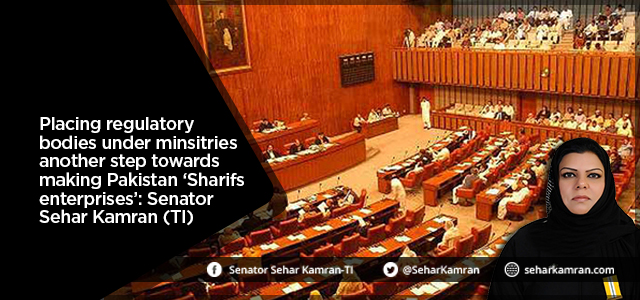 ISLAMABAD: Rejecting the government’s explanation for its decision to place five regulatory bodies under the administrative control of the respective ministries, the opposition in the Senate on ednesday alleged that the rulers’ main target behind the move was to bring the National Electric Power Regulatory Authority (Nepra) under their thumb.
ISLAMABAD: Rejecting the government’s explanation for its decision to place five regulatory bodies under the administrative control of the respective ministries, the opposition in the Senate on ednesday alleged that the rulers’ main target behind the move was to bring the National Electric Power Regulatory Authority (Nepra) under their thumb.
The opposition senators, mostly belonging to the Pakistan Peoples Party (PPP), criticised the overnment for bypassing the Council of Common Interests (CCI) while taking the decision, alleging that the rulers actually wanted to bring Nepra under their heel because of the regulator’s refusal to allow the unrealistically high tariff demanded by a solar power producer and to deprive it of the power to determine tariff for a number of new projects, including the Nandipur plant.
Senate Chairman Raza Rabbani, while taking notice of the government’s decision, allowed the members to take part in the debate after Law Minister Zahid Hamid made a policy statement defending the government action, saying that “there is nothing out of ordinary in shifting regulatory authorities to their line ministries from the cabinet division”.
In a major policy decision, Prime Minister Nawaz Sharif had on Dec 19 transferred the administrative control of five key regulatory bodies to the respective ministries, apparently compromising their relative independence under the cabinet division.
According to a notification issued by the cabinet division, Nepra, the Oil and Gas Regulatory Authority, Pakistan Telecommunication Authority, Frequency Allocation Board and Public Procurement Regulatory Authority had been placed under the ministries concerned.
“This decision is like making a fox look after hens,” said Leader of the Opposition Aitzaz Ahsan while taking part in the debate after the law minister had left the house stating that officials from his ministry would take note of the speeches and he would respond to them on Friday.
Mr Ahsan advised the chairmen of the five authorities to “ignore” the government’s Dec 19 notification. “The government’s decision is repugnant to the Constitution and it (the notification) has no value,” he claimed, adding that the regulators had been placed under the ministries on which these bodies were supposed to keep an eye in order to look after the consumers’ interests.
PPP Senator Farhatullah Babar said four of the five regulatory bodies were just “decoys” so that the transfer of Nepra to the water and power ministry could not attract undue public attention and scrutiny. He claimed that recently a solar producer had demanded a tariff of Rs14 per unit which had been rejected by Nepra, thus annoying the powerful producer and its backers.
He requested the chair to refer the issue to a committee to investigate and expose the real faces and their motives behind the decision.
Endorsing Mr Babar’s viewpoint, former finance minister Saleem Mandviwalla said that there were also many other projects whose tariff had to be determined by Nepra. He predicted that the government would withdraw the notification after achieving its main objective.
PPP’s Seher Kamran alleged that the rulers wanted to make the country “Sharif enterprises” and said the “mala fide intention” of the government was visible in the decision.
Mohammad Ali Saif of the Muttahida Qaumi Movement (MQM) questioned the eligibility of the Nepra chairman and its members, saying that a number of complaints against them were pending before the FIA.
Defending the government, PML-N Senator Mushahidullah Khan said the transfer of the regulatory bodies from the cabinet division meant that the prime minister would not have any direct control over them.
MQM’s Tahir Mashhadi regretted that the government continued its policy of “destroying institutions and bypassing parliament”.
Govt explanation
Earlier, the law minister told the Senate that only administrative control of the regulators had been shifted to line ministries and it was discretion of the prime minister. “The memorandum was issued according to Rules of Business of the federal government. It had been happening time and again in the past and there is nothing out of ordinary in this memorandum,” he explained.
Mr Hamid said all these regulatory bodies had been transferred to different divisions several times by the previous governments since the 1990s. Even today, he said, a number of regulatory authorities such as the Private Educational Institu¬tions Regulatory Authority, Drugs Regulatory Autho¬rity, Pakistan Quality Control Authority, Pakistan Medical and Dental Council and the State Bank were already working under the line ministries. Had there been any policy matter involved in the issue, the government would have no objection on taking it to the CCI.
“It is purely a routine matter. This notification does not affect independence and autonomy of these authorities,” he claimed.
The minister said that if the government desired to influence these authorities, it could easily be done at the cabinet division as well.
Sassui Palejo of the PPP said the law minister had cited the example of previous governments’ decisions but ignored the fact that all such decisions had been taken before the passage of the 18th constitutional amendment which had given the CCI important role of decision-making.
Chairman Rabbani drew the attention of the law minister to the constitutional provisions regarding the role of the CCI and said it appeared that the CCI had been bypassed in this matter.
The minister said the issue had been initially placed on the agenda of the CCI meeting but was later dropped because there was no need for it.
Mr Rabbani reminded the minister that he had reports that the item was dropped from the agenda after objections were raised by the governments of Khyber Pakhtunkhwa and Sindh.
Same version of the article appeared in Dawn News


